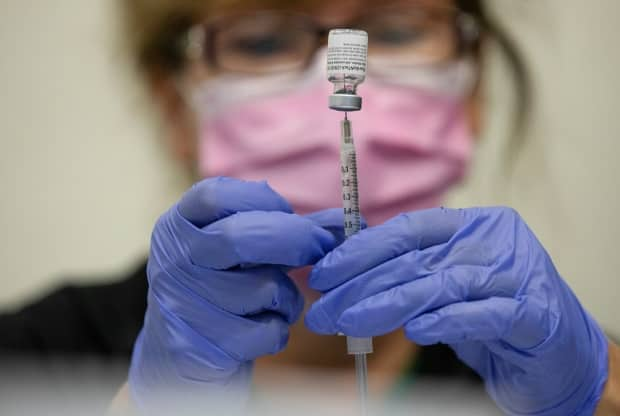N.L. reports 519 new COVID-19 cases, 20th death and a move to Alert Level 4


Newfoundland and Labrador will be moving to a modified Alert Level 4 to deal with record COVID-19 numbers to begin 2022, the provincial government announced Monday.
The province reported 519 new cases — for the seventh straight day, a new single-day record — and its 20th death related to COVID-19, a woman in her 50s in the Central Health region. The active caseload is 2,925, also a new record.
As cases of the highly transmissible Omicron variant continue to spread, Chief Medical Officer of Health Dr. Janice Fitzgerald said she believes it's inevitable that most people in the province will catch COVID-19 at some point.
"I know we all feel that we are done with COVID, but COVID is not quite done with us. Living with COVID means celebrating the good days and summoning all our grit and strength to persevere through the bad days," said Fitzgerald at the provincial briefing Monday afternoon.
There are 276 new cases in the Eastern Health region, 125 in the Labrador-Grenfell Health region, 64 in the Central Health region, 43 in the Western Health region and 11 found through private testing where the region is unknown.
In the past 24 hours, 134 people have recovered from the virus, leaving 2,925 active cases. One person is in hospital due to COVID-19.
Just over 3,300 tests have been completed since Sunday, raising the number of completed tests to 404,008 to date.
Fitzgerald said the spike in cases has pushed the province's health-care system to the brink, saying it can't withstand record cases day after day.
"The reality of this virus is that it's so infectious, most people will acquire it, but our health-care system can't stand the pressure of everyone acquiring it at the same time," she said. At the same time, she said, it's difficult to know what the full effect of the Omicron variant will be.
"We are trying our best to follow a map for a road that is under construction."
Fitzgerald said many people with COVID-19 have mild symptoms, which could be as a result of the province's high vaccination rates.
Alert Level 4
Under the modified Alert Level 4, which comes into effect at midnight and will be reassessed Jan. 17, informal gatherings are limited to 10 people, which Fitzgerald has referred to as a "tight 10." She said the goal of reducing the number of contacts a person has is to limit the spread of the virus.
Burials, weddings, funerals and religious gatherings are limited to 50 people or 25 per cent capacity, whichever is lower. Businesses — including gyms, dance studios and arenas — will follow the same rules. Dancing at formal gatherings is once again prohibited, except for ceremonial dances.
Watch the full briefing here:
Retail stores, including in malls, can remain open at reduced capacity, while restaurants can remain open to 50 per cent capacity as long as distancing between tables can be maintained. Tables are limited to six people, and buffets are prohibited.
There are no changes to child-care services, which can operate at full capacity, or personal-care establishments, which can open in accordance with public health guidelines.
Bars, lounges and cinemas remain closed. Fitzgerald encouraged people who are feeling the stress of high case numbers and isolation to reach out to family or friends, saying people in the province are navigating the storm of COVID-19 together, but in different boats.
"Feeling anxious or lonely is not a sign of weakness, but a sign of being human, as we all are."
Health-care diversions
Health-care staff in the Eastern Health and Labrador-Grenfell Health regions are being diverted to keep on top of the province's pandemic response.
In a statement to CBC News, Eastern Health said more than 200 employees have been redeployed, including nurses and support staff. Staff are being used to help in testing and vaccination, in other urgent areas where they may have previous work experience, or to backfill workers in isolation.
As of Monday afternoon, about 625 health-care workers were in isolation due to either being exposed to COVID-19 or testing positive themselves, according to Eastern Health CEO David Diamond, who added the speed of Omicron's arrival has made the experience different from past waves.
"We had this throughout the previous waves, but this is more intense within the health-care system as it is more intense within the community," he said.

With the diversions come the cancellations of appointments for some patients.
In a media release Sunday evening, Eastern Health said effective Tuesday it will focus solely on emergency acute services at health-care sites in order to redeploy staff to help with the pandemic response.
The health authority said emergency appointments will continue to proceed in the following areas:
Adult outpatient clinics.
Regional medicine program.
Children and women's health.
Rehabilitation, palliative care and geriatric medicine.
Only patients whose appointments are going ahead will be contacted, said Eastern Health.
For surgery, Eastern Health said emergency, cardiac and cancer surgeries are going ahead. Patients whose procedures are going ahead will be contacted.
Medical imaging is also continuing, though in these cases patients will be contacted only if their appointment has been cancelled.
For children and women's health, all maternal fetal assessment unit and prenatal appointments will continue. For all other appointments, patients whose appointments are going ahead will be contacted to confirm.
All radiation therapy and chemotherapy appointments will go ahead. Patients will be contacted directly if there is any change to their clinic appointments, Eastern Health said.
Lastly, all non-urgent appointments for outpatient laboratory services between Tuesday and Friday are cancelled, but emergency laboratory testing and services will continue. Outpatient blood collection sites are restricted to urgent blood collection only, including blood testing for patients requiring INRs, therapeutic drug-level monitoring testing and, for cancer-care patients, monitoring of cancer-clinic profiles and other required cancer-related testing.
A statement from Labrador-Grenfell region late Monday afternoon said although there isn't an outbreak at the Labrador Health Centre, the hospital has begun operating in "outbreak mode" to protect employees.
Resources are being realigned to focus on cancer care, obstetrics, dialysis, mental health and emergency services.
The diversions also come as the province continues to deal with the effect of cyberattack in late October on the health-care system. Diamond said the cyberattack has pushed things back several weeks, but professionals are working to deal with the backlog.
"Had we not had the IT outage, most of our backlog from a COVID perspective would have been looked after by the end of December and a little bit out to the end of March," he said. "Now we've got another blip unexpected."
Testing changes
Fitzgerald also announced changes to testing requirements and testing priority, advising anyone with COVID-19 symptoms who is a high-risk close contact of a previous case to assume they are positive for the virus.
Anyone who is an asymptomatic close contact or living in a high-risk setting should still be tested, she said.
The province has also removed a requirement for close contacts of a previous case to be tested a third time between days 11 and 13 of their isolation period. Fitzgerald said the wait time from filling out a testing referral form to swab collection has fallen to about 48 hours, but results can take as long as three days under the province's current workload.


